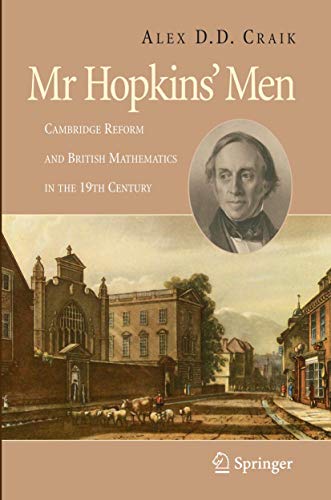Mr Hopkins' Men: Cambridge Reform and British Mathematics in the 19th Century
Craik, A.D.D.
About the Book
Description:
New. Fast Shipping and good customer service. Seller Inventory # Holz_New_1848001320
About this title:
Synopsis: A few years ago, in the Wren Library of Trinity College, Cambridge, I came across a remarkable but then little-known album of pencil and watercolour portraits. The artist of most (perhaps all) was Thomas Charles Wageman. Created during 1829–1852, these portraits are of pupils of the famous mat- matical tutor William Hopkins. Though I knew much about several of the subjects, the names of others were then unknown to me. I was prompted to discover more about them all, and gradually this interest evolved into the present book. The project has expanded naturally to describe the Cambridge educational milieu of the time, the work of William Hopkins, and the later achievements of his pupils and their contemporaries. As I have taught applied mathematics in a British university for forty years, during a time of rapid change, the struggles to implement and to resist reform in mid-nineteenth-century Cambridge struck a chord of recognition. So, too, did debates about academic standards of honours degrees. And my own experiences, as a graduate of a Scottish university who proceeded to C- bridge for postgraduate work, gave me a particular interest in those Scots and Irish students who did much the same more than a hundred years earlier. As a mathematician, I sometimes felt frustrated at having to suppress virtually all of the ? ne mathematics associated with this period: but to have included such technical material would have made this a very different book.
From the Back Cover:
The 19th century was a key period in the development of the mathematical sciences in Britain. Subjects such as rigid-body dynamics, hydrodynamics, elasticity, optics, heat, electricity and magnetism were extended and given firmer foundations; new areas of pure mathematics were explored; and major advances took place in statistics, astronomy, geology and glaciology.
The mid-19th century also brought dramatic changes to Cambridge University. Before 1850, the only pathway to an honours degree was the Mathematical Tripos - taken by all aspiring students whatever their destined careers - and the best teaching was provided by private tutors, the most renowned being the remarkable William Hopkins.
This wide-ranging book tells the story of Hopkins and the education and subsequent careers of his top "wranglers", many of whom went on to have illustrious careers as bishops, judges, politicians, scientists or educators. It draws on first-hand accounts of life at Cambridge to give the reader a glimpse inside its colleges, and it charts the evolution of the curriculum and the slow, often reluctant, reforms that led to Cambridge’s dominance of British higher education. It surveys the scientific achievements of the time and considers the disproportionate contributions made by Scottish and Irish alumni in establishing a research community. Gradually, Cambridge was transformed from a near-moribund institution into a world-renowned centre for the mathematical and physical sciences.
Many famous scientists and mathematicians are profiled, among them G. Green, G.G. Stokes, J.C. Adams, W. Thomson (Lord Kelvin), A. Cayley and J.C. Maxwell, and many lesser-known figures too, including the first professors in Australia and the tutor to an Indian maharajah. In addition, and as a special highlight, Hopkins’ own collection of portraits of his top students, attributed to the artist T.C. Wageman, are published here – in colour – for the first time.
Scholarly yet non-technical, this is a fascinating look at Cambridge during the Victorian era that is accessible to anyone with an interest in the history of science and mathematics; the history of education; the interaction of science and religious belief; the history of Cambridge University; and Victorian Britain generally.
Alex D.D. Craik is a graduate of St Andrews and Cambridge. For many years, he taught applied mathematics at St Andrews University, where he is presently an emeritus professor.
Bibliographic Details
Title: Mr Hopkins' Men: Cambridge Reform and ...
Publisher: Springer
Publication Date: 2008
Binding: Paperback
Condition: new
